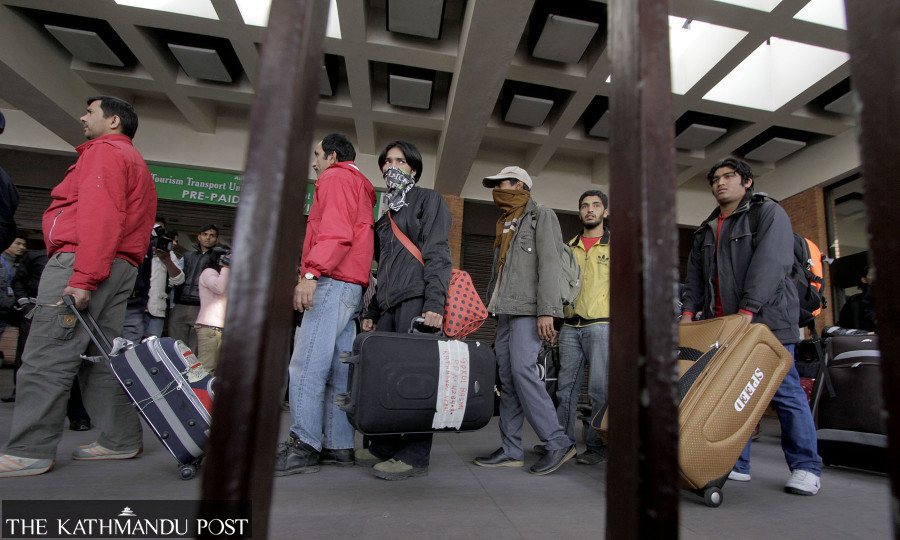National
Kuwait decision to let in only vaccinated foreigners may affect Nepali workers
Foreigners can visit Kuwait starting August 1, but Nepal’s poor Covid-19 vaccination status means fewer Nepali workers can benefit from the scheme.
Chandan Kumar Mandal
In what can be seen as a glimmer of hope for resuming Nepali labour export to Kuwait, a popular labour destination, the Kuwaiti government has decided that it would allow foreign nationals to enter the country from August.
As part of easing its Covid-19 related restrictions, the Kuwaiti government on Friday agreed to allow entry to citizens from countries including Nepal, starting August 1, provided they meet certain conditions.
Migration of Nepali workers to Kuwait, which hosts nearly 70,000 Nepali workers, has remained affected since March last year owing to the Covid-19 pandemic-induced restrictions.
“The Kuwaiti government’s decision to allow entry to foreign nationals has come as a welcome relief for Nepali workers who haven’t been able to visit the Gulf nation for the past several months,” said Sujeet Kumar Shrestha, general secretary of Nepal Association of Foreign Employment Agencies (NAFEA), a grouping of agencies hiring and supplying Nepali migrant workers to foreign employers. “There is a growing shortage of workers in Kuwait so Nepali workers are also in demand.”
According to Shrestha, thousands of Nepali workers can get employment once Kuwait starts welcoming foreign workers.
However, there are still obstacles ahead—mainly the conditions set by the Kuwaiti government for incoming foreigners.
The Kuwaiti government’s Friday decision has allowed entry only to vaccinated expats. According to the decision, from August 1 onwards, vaccinated foreigners who still have valid residence permits will be allowed to enter Kuwait.
Besides, the Kuwaiti government also specified a list of vaccines the foreigners should have taken for entering the country, according to Arab Times, a Kuwaiti newspaper. As per the decision, foreigners who have received vaccines produced by Oxford/AstraZeneca, Pfizer, Moderna and Johnson & Johnson can come to Kuwait, reported the daily.
After entering Kuwait, they will also have to stay in home quarantine for seven days and their quarantine period will end only after they test negative through PCR test.
“While there is demand for thousands of workers in Kuwait, such conditions could put Nepal workers at disadvantage,” said Shrestha. “Allowing only vaccinated workers means not many Nepalis will be able to visit Kuwait whereas workers from India and even Bangladesh will be better able to seize such opportunities. We know the status of vaccination in Nepal.”
However, the Kuwaiti government’s decision to provide entry to only vaccinated foreigners excludes domestics. But unvaccinated returnee domestics will need to stay in institutional quarantine for 14 days.
According to an official at the Nepal Embassy in Kuwait, it has already been several months since Kuwait suspended entry to foreigners including workers, not many Nepalis are back home with valid visas awaiting to return to Kuwait.
“Occasionally we get inquiries from Nepali workers wanting to return to Kuwait. As per our estimation, the number of Nepalis with Kuwaiti visas could be small,” said an official, who is not authorised to talk to the media. “Also, the Nepal government does not allow Nepalis to work as domestics in the Gulf, so they are unlikely to benefit much from this relaxation.”
The Kuwaiti government had first suspended all international flights to and from Kuwait International Airport (KIA) on March 13 last year, barring entry to foreigners including Nepalis.
Later, when the government started easing the Covid-19 related travel restrictions and gradually resumed its passenger flights in phases from August last year, Nepali nationals were still prohibited from entering the country. Nepal was placed on a list of 35 countries, which was later extended to 68, whose citizens were forbidden entry to the Gulf state.
In February this year, when the Kuwaiti government was gearing up to ease its restrictions, the plan was hit by the second wave of the Covid-19 pandemic.
Last month, however, the Kuwaiti government allowed the resumption of direct outgoing flights to Nepal, India, Pakistan, Bangladesh and Sri Lanka starting May 18. The one-way flight resumption could have provided some respite to Nepalis stranded in Kuwait, but they could not benefit from the provision due to Nepal government’s own suspension of international flights.
“Our government should talk to labour destination countries like Kuwait and request them to allow entry to Nepali workers if they follow health protocols,” said Shrestha. “Nepal is already dealing with a shortage of vaccines. In that case, Nepali workers should be asked to show Covid-19 negative PCR results and quarantine instead.”




 16.12°C Kathmandu
16.12°C Kathmandu















